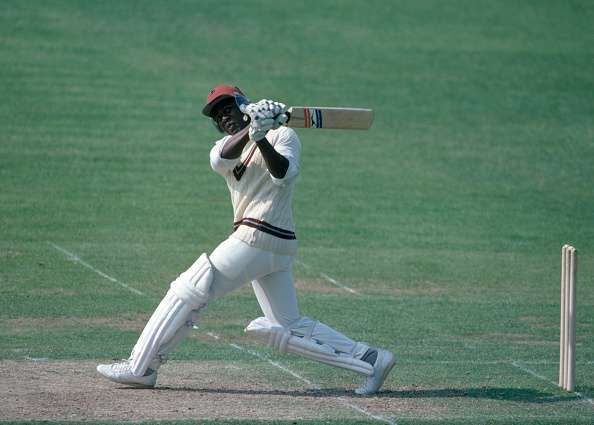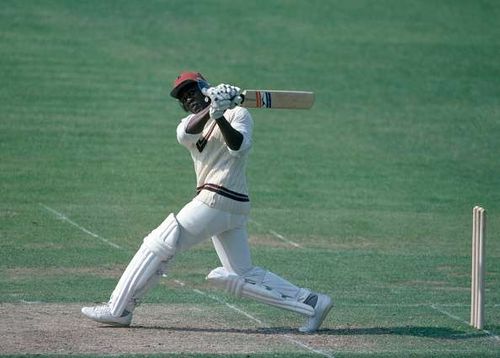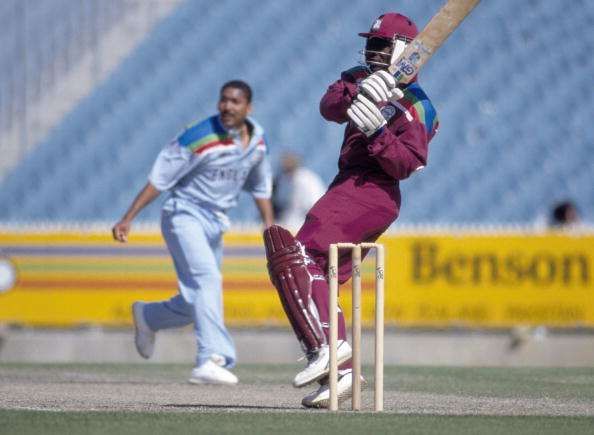
Desmond Haynes: A giant of the game

West Indies’ tour to Australia in 1979/80 was to be their most successful. They went on to win both the Test and One-Day series and stamped their dominance on the cricketing hemisphere which they were to preserve emphatically for the next 15 years. While they lost an acrimonious rubber to New Zealand in 1980, (which was to be their only series loss till 1995) it was this series which proved to the world that them making Tony Grieg grovel in 1976 was no ‘jab-inspired’ fluke.
In the 4th match of the One Day Competition at Melbourne, Australia put West Indies into bat. Just as Greg Chappell’s decision looked like getting vindicated with the early dismissal of Gordon Greenidge, Viv Richards made a mockery of any such thoughts with a dominant 153 not out, carting the much vaunted Australian bowling attack to all parts of (a big) MCG. West Indies won the match by 80 runs, and Richards was given the Man of the Match award.
But what is quickly forgotten is that during his innings, he was involved in a then ODI record partnership of 205 for the 2nd wicket. The batsman, the quiet sheet anchor with whom he forged it was Desmond Haynes, whose innings of 80 was easily overshadowed by Richards’.
One can count many such instances of Haynes’ support act not given its due since for much of his career; he was always seen in the shadow of Greenidge, Lloyd and Richards.
A technically sound and elegant right-hand batsman, Haynes has more to his credit than being just a counterfoil to the stroke play of Richards & Co. There is evidence of his talent in a clip of him smacking Chetan Sharma for three coruscating hook shots in 1989, and in another where he metes out the same treatment to Jeff Thomson in 1983.
In addition to appreciating his batting talents, it is time we also take a look at a career which was for many years was a benchmark when it concluded.
Test Career
Haynes started his career with three consecutive half-centuries vs. Australia in 1978 and went on to register three centuries (all overseas) in the first ten tests that he played. His career can be divided into three parts.
He had a relatively ordinary run from 1980 to mid-1988 where his average (36.72) was easily the lowest amongst all specialist West Indies batsmen.
It is from 1988 onwards that Haynes truly came into his own and significant it was because the form of erstwhile top batsmen in Richards and Greenidge was beginning to wane and it was Haynes along with Richie Richardson who prolonged West Indies’ undefeated run.
Period
Mtchs
Inns
n.o.
Runs
Average
100s
50s
3 Mar'78 - 19 Jun'80
10
18
1
918
54.00
3
5
10 Jul'80 - 3 Aug'88
65
109
13
3526
36.73
6
22
4 Aug'88 - 8 Apr'94
41
75
11
3043
47.55
9
12
Table 1: Haynes Career Summary
It is from 1988 onwards that Haynes emerged as one of the top batsmen in the world. His overall aggregate was exceeded only by Richie Richardson amongst West Indians, and for batsmen who scored at least 2500 runs in this period, Haynes’ average was only bettered by Gooch, Steve Waugh, Richardson and Boon. His century tally is also exceeded only by Boon, Taylor and Gooch.
But more than his aggregates, it was his contribution in pivotal matches that mark him out as a special player. 7 out of his nine centuries in this period came in wins, and 5 of them were in games that decided the outcome of series he scored them in.
Batsman
Mat
Inns
NO
Runs
Ave
100
50
David Boon
61
110
15
4668
49.13
12
21
Mark Taylor
54
97
6
4275
46.97
12
24
Graham Gooch
41
76
2
3956
53.45
11
20
Allan Border
62
101
17
3831
45.6
5
29
Robin Smith
48
90
14
3333
43.85
8
23
Richie Richardson
40
71
5
3272
49.57
9
17
Desmond Haynes
41
75
11
3043
47.54
9
12
Steve Waugh
47
71
14
2819
49.45
7
13
Alec Stewart
36
68
4
2536
39.62
6
13
Table 2: Top Batsmen (Aug 1988-Apr 1994)
West Indies headed into the 4th test match in the Wisden Trophy, 1990 1-0 down. England had registered its first victory over West Indies since 1973 at Kingston. A series defeat to England would have effectively put a final nail in the coffin of West Indian dominance.
But Desmond Haynes had other ideas, his steady 109 in West Indies’ 2nd Innings ensured that West Indies gave England an ambitious 356 run target in the 4th innings, any hopes of achieving which were polished off by Curtly Ambrose.
But Haynes didn’t stop there, in the 5th test at Antigua he smashed a cracking 167 and added 298 for the first wicket with Gordon Greenidge (149) to hand over an innings defeat to the Englishmen and put paid to any hopes they had of winning a rubber vs. West Indies. It would take them a further ten years to win one.
Hs 111 vs. Australia in the 2nd test of the 1991 Frank Worrell trophy was an effective counterfoil to Richardson’s ballistic 182 which set up a 1-0 score line for the series, one from which the Australians never recovered.
Similar was the significance of his twin hundreds vs. Pakistan (143 & 125) in 1993. Significant because he was by then the most experienced batsman in the team and had to carry a greater load of setting up the innings for the likes of Lara, Hooper and Athurton to build upon.
Haynes’ partnership with Greenidge remains the most prolific opening pair in Test History. The pair holds the record for having played the most innings, scored the most runs and had more hundred-plus partnerships than any other opening pair.
Partners
Span
Inns
NO
Runs
Ave
100
50
Gordon Greenidge and Desmond Haynes (WI)
1978-1991
148
11
6482
47.31
16
26
Matthew Hayden and Justin Langer (AUS)
2001-2007
113
4
5655
51.88
14
24
Alastair Cook and Andrew Strauss (ENG)
2006-2012
117
2
4711
40.96
12
18
Marvan Atapattu and Sanath Jayasuriya (SL)
1997-2007
118
7
4469
40.26
9
24
Gautam Gambhir and Virender Sehwag (IND)
2004-2012
87
3
4412
52.52
11
25
Michael Slater and Mark Taylor (AUS)
1993-1999
78
2
3887
51.14
10
16
Bill Lawry and Bob Simpson (AUS)
1961-1968
62
3
3596
60.94
9
18
Jack Hobbs and Herbert Sutcliffe (ENG)
1924-1930
38
1
3249
87.81
15
10
Chetan Chauhan and Sunil Gavaskar (IND)
1973-1981
59
3
3010
53.75
10
10
Table 3: Top Opening Pairs in Tests
One of the defining features of Desmond Haynes’ career was his prolific run-scoring at home. Amongst West Indian batsmen who have scored at least 2000 runs at home, Haynes’ average is exceeded only by Walcott, Weekes, Sobers, Lara and Chanderpaul. Through his career span, he was clearly the most prolific West Indian batsman at Home, exceeding the averages of Richardson, Richards and Greenidge by a fair margin.
Considering all batsmen into account, only Zaheer Abbas, Mohammad Azharuddin and Sunil Gavaskar exceed Haynes’ home average (56.05) during his career span.
Batsman
Mat
Inns
NO
Runs
Ave
100
50
Clyde Walcott
25
42
5
2584
69.83
11
9
Everton Weekes
23
40
5
2420
69.14
7
10
Gary Sobers
44
75
14
4075
66.8
14
12
Brian Lara
65
111
5
6217
58.65
17
26
Shiv Chanderpaul
81
133
27
6187
58.36
19
32
Desmond Haynes
49
84
15
3868
56.05
10
22
Richie Richardson
42
70
6
3217
50.26
10
11
Table 4: Highest home average for West Indian batsmen
Player
Mat
Inns
NO
Runs
Ave
100
50
Zaheer Abbas
28
37
8
2224
76.68
8
5
Mhd Azharuddin
26
33
1
2003
62.59
9
4
Sunil Gavaskar
50
78
6
4082
56.69
14
17
Dilip Vengsarkar
53
78
12
3716
56.3
13
15
Desmond Haynes
49
84
15
3868
56.05
10
22
Javed Miandad
54
76
9
3715
55.44
12
13
Mudassar Nazar
32
47
6
2158
52.63
7
8
Richie Richardson
38
62
5
2988
52.42
9
11
Robin Smith
29
54
10
2291
52.06
7
14
Martin Crowe
31
50
4
2371
51.54
8
7
Greg Chappell
28
49
5
2225
50.56
8
7
Table 5: Highest Home Averages (Mar’78-Apr’94)
Haynes ‘contribution in matches won at home is second only to Gary Sobers in the history of West Indian cricket. His average of 66.34, coupled with eight centuries is comfortably ahead of his contemporaries Richardson, Richards and Greenidge. A fact which is not appreciated as Haynes’ average overseas games is not up to the mark (33.50).
I believe that performance on home pitches is as vital a component of a cricketer’s evaluation as any other and overseas averages should not become the sole criterion to measure batsman quality.
Player
Mat
Inns
NO
Runs
Ave
100
50
Gary Sobers
11
17
3
1322
94.42
5
3
Desmond Haynes
30
54
13
2720
66.34
8
14
Shiv Chanderpaul
27
42
10
2101
65.65
8
10
Brian Lara
22
37
3
2076
61.05
5
12
Richie Richardson
25
40
5
1918
54.8
6
7
Viv Richards
28
37
2
1766
50.45
6
8
Gordon Greenidge
26
44
7
1832
49.51
5
8
Chris Gayle
17
30
5
1006
40.24
3
5
Table 6: Averages in matches won in West Indies
Haynes’ ability to see off the new ball was second to none, to this date he remains the only batsmen to have carried his bat through a Test innings thrice.
Player
Occasions
Desmond Haynes
3
Bill Woodfull
2
Len Hutton
2
Glenn Turner
2
Bill Lawry
2
Table 7: Openers carrying the bat in Tests
One-day international career

While his test credentials are imposing enough, Haynes’ one day record is a cut above it. When he retired in 1994, he was the most prolific ODI batsman of all time. He had played the most matches, scored the most runs and had the most number of centuries to his name. His numbers were the summit that top batsmen were out to scale. Tendulkar overtook his century tally in 1998, and his runs tally was surpassed by Azharuddin the same year.
Haynes made his ODI debut vs. Australia in 1978, and his score of 148 n.o remains the highest score made in an ODI debut.
Like most great batsmen, Haynes reserved his best for the (second) most dominant side of his era, Australia. His six centuries are the second most scored vs. Australia by any batsman and 4th best on the all -time list against all opposition.
Player
Mat
Inns
NO
Runs
Ave
100
50
Sachin Tendulkar
71
70
1
3077
44.59
9
15
Desmond Haynes
64
64
8
2262
40.39
6
13
Viv Richards
54
50
7
2187
50.86
3
20
Brian Lara
51
50
3
1858
39.53
3
15
Kumar Sangakkara
46
46
4
1813
43.16
2
12
Jacques Kallis
50
50
2
1660
34.58
1
13
Mahela Jayawardene
56
54
5
1629
33.24
0
16
Jonty Rhodes
55
52
12
1610
40.25
0
10
Table 8: Most Runs vs. Australia
Haynes’ record vs. Pakistan is also nothing short of extraordinary. His runs tally vs. Pakistan is 9th on the all-time list and the second-best vs. Pakistan after Sachin Tendulkar.
Haynes was at his peak between Jan 1984 and Nov 1989; his numbers were way ahead of his contemporaries. Part of it can be credited to the fact that he was an opener, but there are opening batsmen sitting way below him on this list.
He scored almost 850 runs more than the next batsman (Viv Richards), and his average of 50.07 is also the highest by any batsman in that period. 15 of his 17 career centuries were also scored in the period in consideration, placing him at nine centuries more than both Greenidge and Richards.
Player
Mat
Inns
NO
Runs
Ave
100
50
Desmond Haynes
115
114
19
4757
50.07
15
25
Viv Richards
115
100
14
3902
45.37
6
28
Javed Miandad
105
102
21
3822
47.18
4
28
Richie Richardson
119
117
16
3484
34.49
2
28
Allan Border
116
110
15
3101
32.64
2
22
Dean Jones
82
81
14
2959
44.16
3
22
Kris Srikkanth
97
97
3
2814
29.93
4
19
Rameez Raja
95
94
5
2806
31.52
2
19
Geoff Marsh
76
76
4
2805
38.95
7
11
Salim Malik
99
92
12
2747
34.33
4
16
David Boon
79
77
0
2576
33.45
2
15
Gordon Greenidge
63
62
5
2547
44.68
6
14
Table 9: Top Batsmen (Jan 1984-Nov 1989)
Haynes’ love for his home pitches is evident in ODIs too; keeping a cut off for 2000 runs, Haynes’ average at home is the highest of all time and is 9 points more than the next places Virat Kohli. Only Tendulkar, Ponting, Kohli and Amla have more centuries at home than Haynes.
What’s startling about this statistic is that the next placed West Indian on the list is Brian Lara with an average of 44.16, almost 23 points less than Haynes’. His contribution to his team’s fortunes at home can simply not be understated.
Player
Mat
Inns
NO
Runs
Ave
100
50
Desmond Haynes
49
49
11
2573
67.71
10
12
Virat Kohli
68
65
10
3202
58.21
11
18
MS Dhoni
105
95
29
3811
57.74
6
22
Inzamam ul Haq
75
64
17
2674
56.89
4
17
Michael Bevan
93
80
29
2849
55.86
2
19
Hashim Amla
51
51
3
2674
55.70
11
13
AB DE Villiers
84
81
13
3565
52.42
8
23
Ajay Jadeja
60
56
15
2129
51.92
4
14
Mohammad Yousuf
71
66
12
2767
51.24
7
20
Table 10: Highest Average in home matches (min 2000 runs)
Desmond Haynes’ legacy is not recognised because he was surrounded by some of the game’s greats through the majority of his career. It is a deeper dive into his numbers which brings out the big picture, and Haynes fits into it like a champion. It is time we speak of him in the breath which was hitherto reserved for Richards, Greenidge and Lloyd.